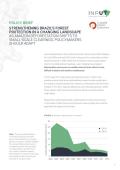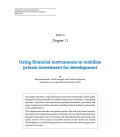This report provides an overview of PFMs that mobilise and leverage commercial financing, build commercially sustainable markets, and increase capacity to deliver clean energy and other climate-mitigation technologies, projects and businesses. These mechanisms can play a prominent role in the implementation of an international mitigation strategy.
The report is based on a substantial body of experience in a wide variety of developed and developing countries. It suggests ways in which PFMs could be used at the national and international scale, offers scale up and replication strategies, and identifies how they might fit into a new financial framework under the UNFCCC.

Annual deforestation rates in Brazil’s Amazon fell by almost 80% between 2004 and 2012 due in large part to conservation policies Brazil introduced in 2004. While this is welcome news to policymakers intent on combating forest clearings, a new challenge has emerged: deforestation now occurs on smaller tracts of land, which is more difficult to detect and remains unaddressed.
The study provides a review of the most innovative financing mechanisms employed by public entities in a range of countries around the world. These public institutions may invest in, or provide financial support to, companies and / or individuals who contribute to the reduction of carbon emissions through cleaner energy usage.

This chapter describes a range of financial instruments increasingly used by public development finance providers to mobilise resources for investment in developing countries. It focuses on the functioning of pooling mechanisms, guarantees and equity investments, and their potential to mobilise private investment in key sectors such as infrastructure.This chapter also includes two opinion pieces. The first is by Pierre Jacquet, President of the Global Development Network, on how official development assistance should be used to enhance risk sharing between the private and public sectors. The second is by Owen Barder of the Center for Global Development on stimulating private investment by ensuring genuine returns for success.
The European Emissions trading Scheme (EU ETS) was launched in 2005. The scheme started off with a limited scope, but has gradually expanded, in terms of geographical, sectoral and gas coverage. This report analyses the possibilities for further sectoral expansion in the Nordic countries. The analysis is done in terms of barriers and solutions for inclusion of four major sectors currently outside the scope of the scheme: transport, heating, agriculture and fisheries, and waste. Focus is on the road transport sector, which is a major source of greenhouse gas emissions in the Nordic countries. The main barriers identified for inclusion of road transport are related to the overlap with existing policy instruments, high administrative costs of downstream inclusion, and potential loss of fiscal revenue. Experiences from other trading schemes show that the barriers can be overcome.
